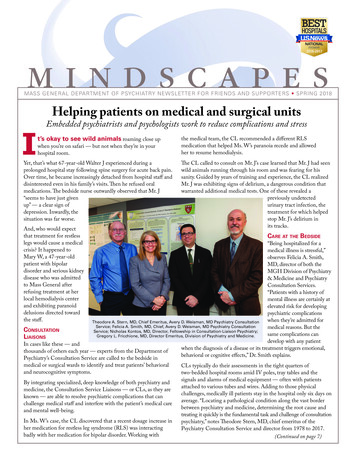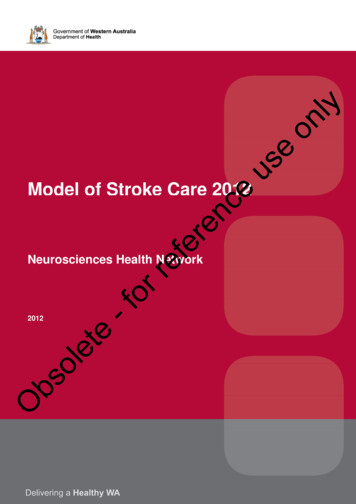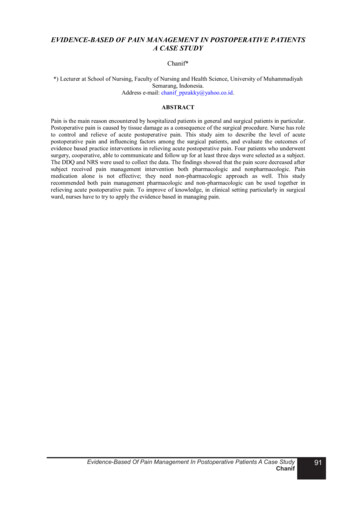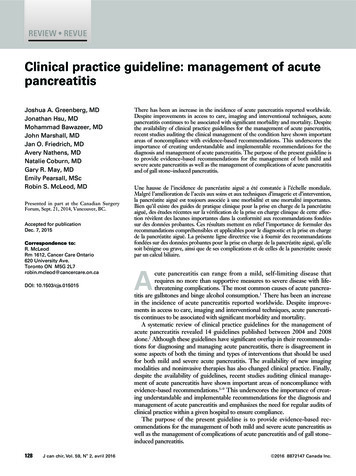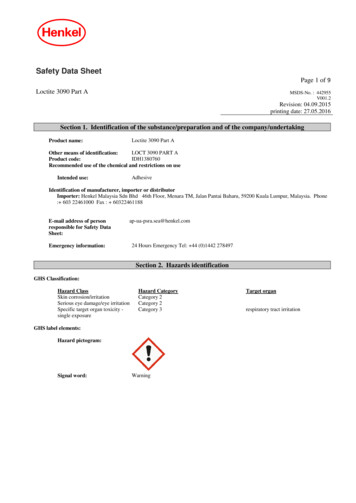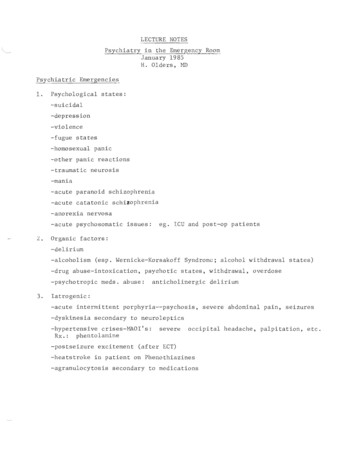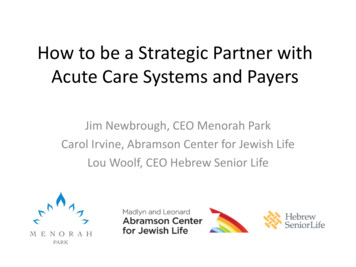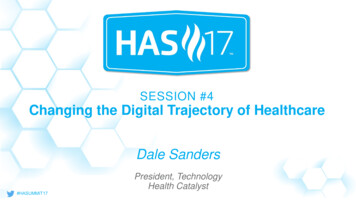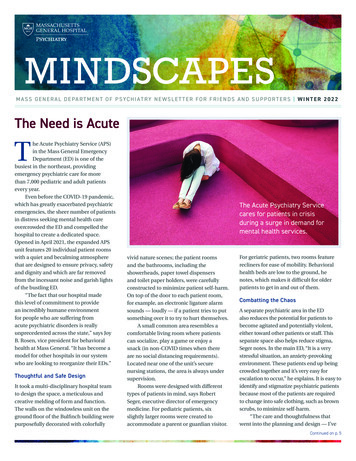
Transcription
M A S S G E N E R A L D E PA R T M E N T O F P S Y C H I A T R Y N E W S L E T T E R F O R F R I E N D S A N D S U P P O R T E R S W I N T E R 2 0 2 2The Need is AcuteThe Acute Psychiatry Service (APS)in the Mass General EmergencyDepartment (ED) is one of thebusiest in the northeast, providingemergency psychiatric care for morethan 7,000 pediatric and adult patientsevery year.Even before the COVID-19 pandemic,which has greatly exacerbated psychiatricemergencies, the sheer number of patientsin distress seeking mental health careovercrowded the ED and compelled thehospital to create a dedicated space.Opened in April 2021, the expanded APSunit features 20 individual patient roomswith a quiet and becalming atmospherethat are designed to ensure privacy, safetyand dignity and which are far removedfrom the incessant noise and garish lightsof the bustling ED.“The fact that our hospital madethis level of commitment to providean incredibly humane environmentfor people who are suffering fromacute psychiatric disorders is reallyunprecedented across the state,” says JoyB. Rosen, vice president for behavioralhealth at Mass General. “It has become amodel for other hospitals in our systemwho are looking to reorganize their EDs.”Thoughtful and Safe DesignIt took a multi-disciplinary hospital teamto design the space, a meticulous andcreative melding of form and function.The walls on the windowless unit on theground floor of the Bulfinch building werepurposefully decorated with colorfullyThe Acute Psychiatry Servicecares for patients in crisisduring a surge in demand formental health services.The Child Resiliency Program HelpsOur Kids Overcome Challenges andFor geriatric patients, two rooms featurevivid nature scenes; the patient roomsPrepare forreclinersWhateverNextfor easeComesof mobility.Behavioraland the bathrooms, including theshowerheads, paper towel dispensersand toilet paper holders, were carefullyconstructed to minimize patient self-harm.On top of the door to each patient room,for example, an electronic ligature alarmsounds — loudly — if a patient tries to putsomething over it to try to hurt themselves.A small common area resembles acomfortable living room where patientscan socialize, play a game or enjoy asnack (in non-COVID times when thereare no social distancing requirements).Located near one of the unit’s securenursing stations, the area is always undersupervision.Rooms were designed with differenttypes of patients in mind, says RobertSeger, executive director of emergencymedicine. For pediatric patients, sixslightly larger rooms were created toaccommodate a parent or guardian visitor.health beds are low to the ground, henotes, which makes it difficult for olderpatients to get in and out of them.Combatting the ChaosA separate psychiatric area in the EDalso reduces the potential for patients tobecome agitated and potentially violent,either toward other patients or staff. Thisseparate space also helps reduce stigma,Seger notes. In the main ED, “It is a verystressful situation, an anxiety-provokingenvironment. These patients end up beingcrowded together and it’s very easy forescalation to occur,” he explains. It is easy toidentify and stigmatize psychiatric patientsbecause most of the patients are requiredto change into safe clothing, such as brownscrubs, to minimize self-harm.“The care and thoughtfulness thatwent into the planning and design — I’veContinued on p. 5
AA Messagefrom the ChiefWinter 2022 s a friend of the department, Iknow you are well aware of thealarming mental health crisiswe are facing in this country after twoyears of the COVID-19 pandemic. I amtremendously grateful to my Psychiatrycolleagues at Mass General who areworking day in and day out to serve andtreat patients with mental health needs.Access to care is a growing problem.That people are suffering because thereare not enough doctors and not enoughbeds weighs heavily on us. For thisreason, I recently wrote a commentarypublished in the Boston Globe thatcalled on legislators, insurancecompanies and regulators to respondboldly and swiftly to what I referred to as a “mentalhealth pandemic within a pandemic.”Since March 2020, psychiatric emergencieshave emerged as a tremendous challenge, not justfor Mass General but also nationwide. Psychiatricpatients sometimes wait for days — even weeks— in hospital Emergency Departments, as thisissue’s cover story illustrates. Results of a recentnational study, led by Associate Chief for ResearchRoy Perlis, MD, indicate that rates of depression areroughly three times what was observed prior to theCOVID-19 crisis, and that most adults with mentalillness do not receive treatment.To address this challenge, I recommendincreasing the number of trained mental healthclinicians to improve access to care; expandingthe number of psychiatric beds to allow for greaterability to treat the acutely ill; improving insurancereimbursements for psychiatrists and psychologiststo reduce the incentive for clinicians to acceptonly those who pay out of pocket; and allowingclinicians to provide virtual care across state linesto optimize mental health care.Vol. 15, No. 1giving.massgeneral.org2mass general department of psychiatryChief of PsychiatryMaurizio Fava, MDSenior Director ofDevelopmentAlex DippoldSenior Director ofCommunicationsKatie SpiegelSenior EditorMary HurleyI invite you to read the full op-ed; scan the QRcode below with your smart phone camera.New digital technologies, treatments andmodels of care will help solve the problem ofaccess to care and Mass General Psychiatry is in theforefront of developing innovative approaches tomeet the demand. One initiative is the new Centerfor Digital Mental Health, which we launchedin January and is led by Chief of Psychology Dr.Sabine Wilhelm. As you will see in this issue, ourfaculty are working on groundbreaking treatments,such as ketamine and psychedelics. They holdgreat potential to help individuals with severedepression, while keeping them out of hospitalinpatient units and, indeed, hospital emergencydepartments — and, above all, lessening theirsuffering and saving their lives.MAURIZIO FAVA, MDPsychiatrist-in-ChiefProduction ManagerEmma HobartPhotographyMGH PhotographyDesignCatalano Design
A Trusted Leader Takes the ReinsHospital Veteran Dr. David F.M. Brown is the New President of Mass General“As the new president of this greathospital, I want to reiterateMass General’s resolute commitmentto providing outstanding psychiatricservices,” says David F. M. Brown, MD, whoassumed his role in September 2021.Psychiatry is the second largestdepartment in the hospital after Medicineand addresses the mental health needsof one out of every eight patients in MassGeneral’s medical and surgical units. “Itis a point of pride that the department isconsistently named one of the best in thecountry by U.S. News and World Report,”Brown says.Dr. Brown is an MGH “lifer” who cameto Mass General in 1989 as an intern andnever left, joining the faculty in 1992 as apracticing Emergency Medicine physicianand later serving as department head. Aspresident, he succeeds Peter L. Slavin, MD,whom he considers a mentor and a friend.Dr. Brown says he shares Dr. Slavin’s deepcommitment to psychiatry services in ageneral hospital and to advancing patientfocused care and hospital-based research.For Dr. Brown, “the patient is keptat the center of every discussion andas part of every decision.” In his 33years at the hospital, he notes, he hasbeen “continuously impressed by thecompassionate expertise of department (ofpsychiatry) clinicians and their dedicationto alleviating patient suffering.”The prolonged COVID-19 pandemichas presented many challenges to thehospital community. “From the start, thepsychiatry department quickly and adroitlyaddressed the unprecedented mentalhealth needs of our patients and also ourstaff,” he says.During the first surge of the pandemicin the spring of 2020, Dr. Brown wasserving as chair of Emergency Medicineand personally cared for COVID patients inthe Mass General emergency department(ED). He moved out of his home for almostfour months to protect his wife and family,As president, Dr. Brownsucceeds Peter L. Slavin,MD, whom he considersa mentor and a friend. Heshares Dr. Slavin’s deepcommitment to psychiatryservices in a generalhospital and to advancingpatient-focused care andhospital-based research.David F. M. Brown, MD, the new president of Mass Generalincluding his daughter who lives nearbyand was pregnant at the time. He stayed ina Beacon Hill apartment near the hospitalwhere he could check in daily with all threeshifts of care providers in the ED.“In emergency medicine, wesigned up for this a long time ago — theexpectation that we would be the first waveon the beach to serve our community,but the impact on our team’s collectivemental health has been cumulative andsignificant,” he said.That first wave of caregiving extends topatients in need of psychiatric emergencycare. With the support of Dr. Slavin, Dr.Brown championed the expansion of theAcute Psychiatry Service (APS) in the ED(see this issue’s cover story). “The previousAPS was markedly undersized for the ED’svolume of patients, creating challenges intheir care delivery as well as challengesfor the staff caring for other ED patients,”he says.The hospital committed 22.5 millionto the two-phase project and hired morethan 90 clinicians and other personnel tofully staff the unit.“We were very excited to open this newand enlarged unit to care for these patients.This is a groundbreaking approach topsychiatry care.”Dr. David Brown will be the specialguest speaker at the 11th AnnualVisiting Day of the MGH LeadershipCouncil for Psychiatry on June 6,2022. The symposium is a signatureeducational event of the LeadershipCouncil and features distinguishedfaculty of the Department of Psychiatrysharing the latest advances in clinicalcare and research.The mission of the LeadershipCouncil is to advance knowledge andtreatment of mental illness, reduce itsstigma and promote understandingand compassion for those whosuffer. Council members serve as“ambassadors” for the department,galvanized by the great need for mentalhealth care and research to find newand improved treatments.To learn more, visit the LeadershipCouncil’s web page:giving.massgeneral.org/psychiatryleadership council.mindscapes newslet ter3
Hope in a VialThe IV Ketamine Clinic is helping people with severe depression reclaim their livesIt’s 5:00 pm. The clinic’s first patients of the evening, an elderly manwith a cane and a young woman with short hair, are upstairs, waiting,as Cristina Cusin, MD, retrieves the vials of ketamine from the pharmacytechnician in the hospital basement. Dr. Cusin and her team will inject avial slowly into the vein of each patient’s arm to provide relief for theirsevere depression.For some patients this vial “is literally the difference betweenfunctioning or almost dead,” Dr. Cusin says, with her characteristiccandor and passion for her work. “People don’t realize what reallysevere depression is like. It is a beast,” she notes. She likens it to aStage 4 advanced disease diagnosis.Dr. Cusin is director of the IV Ketamine Clinic at Mass General,which opened in 2018. Ketamine is a medication primarily used asanesthesia and, illegally, as a hallucinogen, but it is proving effective atreducing severe depression and suicidality. The current treatments formajor depressive disorder, which is associated with a 20-fold increasein risk of suicide, can take weeks or months to work. Ketamine rapidlydecreases depression in patients at high risk for suicide and suicideattempts, with fewer side effects.“She never loses hope. Her heart is huge,” is what her colleaguessaid when they nominated her for the Department of Psychiatry’s first“Clinical Excellence Award” (she was one of three recipients in January).“The most treatment-resistant patients are her patients.”A Unique ModelThe IV Ketamine Clinic is one of a handful in the country that is actuallyintegrated in an academic center, says David Mischoulon, MD, director ofthe department’s Depression Clinical and Research Program. “As such,the clinical care is strongly supported by findings obtained in clinicaltrials,” he notes.Ketamine therapy consists of a series of infusions that need to beadministered and carefully monitored in a clinical setting. Dr. Cusinrelies on current data to guide her treatment plans and individualizedoses and regimens for her patients, “unlike some commercial clinicsthat use one-size-fits-all dosing schemes and are often operated bynon-psychiatric practitioners who may be less knowledgeable aboutdepression,” Dr. Mischoulon notes.The clinic has a three and half month wait list and remained openthroughout the COVID-19 pandemic because it was considered essentialto “prevent worsening and possible hospitalization of the high-riskpatients we serve,” says Dr. Cusin. It recently received authorization totreat teenagers, in the range of 15 to 18 years old. Dr. Cusin has seenpatients whose depression started at age 8, who attempted suicide byage 12 and who have failed many treatments already by age 15.While ketamine holds great promise for patients, it also presents ahost of challenges, even at Mass General, where department leadership isstrongly committed to the therapy.4mass general department of psychiatryDr. Cristina Cusin, second from left, with several staff members of the IV Ketamine Clinic atMass General.The effects are relatively short-lived. Ketamine alleviatessymptoms of depression and suicidality in almost 50% of patients, oftenwithin one day, and its effects lasts for two to four weeks. Most patientswill relapse within weeks after stopping treatment and need ongoingmaintenance.More Research NeededThe American Foundation for Suicide Prevention recently awardedDr. Cusin a 1.3 million grant to study the real-world effectiveness ofmaintenance treatment with IV ketamine for six months in patients whoare hospitalized for suicidality and depression.However, ketamine as a psychiatric treatment is viewed asexperimental by traditional funding sources, such as federal agencies,and also by insurance companies. The treatments, which currentlycost 530 per infusion visit, are typically not covered by insurance.After years of negotiations, in October 2020, Blue Cross Blue Shieldof Massachusetts and AllWays Health Partners, signed contracts withMass General to reimburse a fraction of the patient billing.A Significant NeedApproximately 20 patients per night are treated at the clinic, whichcurrently operates three evenings per week out of the BloodTransfusion Service on the ground floor of the Jackson Building.Patients have complicated mental and, often, physical health needs,including severe anxiety and PTSD and require support from specialistsand an integrated care team. More space is needed, and moreresources, including a case manager, a social worker and clinicians,especially therapists, who can follow the patients on an outpatient basis,Dr. Cusin says.“People with severe depression often get re-hospitalized, orre-attempt suicide within a few months. We can’t simply dischargethem and hope for the best,” she says. “If we can keep people out ofthe hospital and out of the morgue, that means that ketamine makes adifference.”
The Need is Acutecontinued from p. 1never seen anything like it,” says APS NurseManager Margaret Ford, RN.“The ED was all-in,” says Rosen of thedesign team. “The new space was to alleviateovercrowding in the ED overall, but the focuswas also on making sure that psychiatrypatients received the care they need.”A Different TimeTwo years into the pandemic, however, theimpressive, state-of-the art unit does nothave enough beds to meet the demand.“Right now, the mental health crisis is apandemic within a pandemic. These areproblems that are not going to be quicklysolved,” Rosen says.“The environment of care in our newspace is tremendously better. It is a greatstep up from the ED. But it is not a solutionto the fact that people are boarding fordays, sometimes weeks, particularlypediatric patients,” says APS DirectorSuzanne Bird, MD.The APS exceeds capacity every singleday. Acutely ill patients, some of whom areagitated, prone to violence or homeless,can still spend days in the main ED, on arecliner or on a stretcher in a hallway. Inthe APS itself, some patients wait weeksfor transfer to care or placement in anappropriate treatment facility. One sevenyear-old patient recently spent four weeksin the unit.“It’s heartbreaking,” says Ford. Thenumber of pediatric patients who seekcare in the ED has increased duringthe pandemic, including children withbehavioral dysregulation and autismspectrum disorders, she notes.“Yesterday, we had 49 patients,”Dr. Bird says during a recent tour of thespace. “That means 29 patients are spreadall around the rest of the ED.” Even forpatients in the new APS unit, with atelevision and a private, comfortable placeto rest, “you are still stuck in a room for24 hours a day,” she says.When the planning process began in2018, metrics showed that a unit of 20 bedswould be able to accommodate most of theLeft, nurse Manager Margaret Ford, RN, and Director Suzanne Bird, MD, in the Acute Psychiatry Service unit at Mass General.Right, patients meet with visitors and staff in a specially designed common area.APS patients, or the 75th percentile, Segernotes. That is no longer the case.The pandemic and its host ofdetrimental effects on mental health,including the toll of isolation, the loss ofloved ones and livelihoods and the rise insubstance use disorders, is one reason, butnot the only one, for the dramatic increasein patients.This winter, patients are staying longerin the ED because inpatient units in thehospital and throughout the region havefewer beds because of staffing shortages,including vacancies and COVID-positivecases among staff and patients. In January,Rosen noted that 200 beds were offline thatday throughout the Mass General Brigham(MGB) system. With the nationwide shortageof outpatient services, as well as inpatientfacilities, individuals seek psychiatric help inthe ED because there is nowhere else to go.“The problem is the wait,” Dr. Birdsays. “The ED is not a place to get better.”Rosen agrees. “Unfortunately, the APSis facing challenges. It is not set up to be aninpatient unit. It is not designed that wayand not staffed that way.”Solutions on the HorizonFortunately, however, the hospital’scommitment to the new space alsoextended to increased staffing levels —more nurses and more mental healthprofessionals — so patients can receive notonly evaluation and assessment but alsotreatment, allowing for the possibility thatthey can be discharged without transfer toanother facility. In addition, philanthropyhas helped, such as the recent gift fromGary and Melissa Tearney to support anew half-time child psychologist positionin the APS. Funding is also needed forstaff support, to address burnout and topromote professional development.Solutions to the boarding crisis maybe on the horizon, says Rosen, includingfast-acting medications and treatmentsto decrease the need for the ED, andpolitical leadership, at least on the statelevel in Massachusetts, that is committedto expanding mental health services. Thelarger-scale challenges to mental healthcare, she notes, range from insufficientinsurance reimbursements to yearsof programmatic underfunding andworkforce shortages.“To be totally honest, the entire systemneeds to be overhauled,” says Dr. Bird.“We need a complete restructuring of howmental health care is provided in this stateand in the country.”mindscapes newslet ter5
Investigating the Aging BrainOptimal mental health in older adults a research focus of Mass General’s Olivia I. Okereke, MD, MSFor older adults, the fear of cognitiveimpairment and dementia can cloudtheir future. Geriatric psychiatrist andepidemiologist Olivia I. Okereke, MD, MS,is working to reduce that uncertainty andpromote optimal mental health in laterlife through research focused on noveland effective prevention strategies andpotential interventions.“Imagine that you could take a bloodtest at a local lab and that it would giveyou a profile of risk 10 to 15 years into thefuture,” says Dr. Okereke, who is directorof geriatric psychiatry at MassachusettsGeneral Hospital and associate professorat Harvard Medical School. She is also aTerry and Jean de Gunzburg MGH ResearchScholar 2021-2026.Biomarkers Hold the KeyMore than five million Americans areaffected with Alzheimer’s disease (AD,which has no cure; millions more sufferwith mild cognitive disorders and are atrisk for AD). The behavioral symptoms ofcognitive disorders can often be the mostimpairing in daily life. Dr. Okereke’s goal isto identify novel pathways and biomarkersunderlying behavioral problems in AD.Dr. Okereke is heavily invested inbiomarker science, where characteristicsof the body can be measured, usingblood samples or neuroimaging, andleveraged to identify underlying factorsimpacting cognitive disorders in agingadults. Biomarkers hold the key to earlyintervention, and, indeed, prevention ofAD and cognitive disorders. “It would bean exciting breakthrough to identify suchmarkers in blood samples, as collectingblood involves low burden for patients andis widely accessible,” she notes.“Philanthropic support could fundcritical pilot data that would greatlyincrease the chances of subsequent federalgrant awards for doing this kind of work inlarger samples,” says Dr. Okereke. “Withadditional resources, we could multiply6mass general department of psychiatry“Imagine that you couldtake a blood test at a locallab and that it would giveyou a profile of risk 10 to 15years into the future.”— DR. OLIVIA OKEREKE,Psychiatrist and Epidemiologistby tenfold research into other types ofbehaviors. We have a lot of potential withthese areas of investigations to do novelthings,” she adds.The Role of Vitamins and SupplementsDr. Okereke’s work also addresses molecularand metabolic mechanisms of how vitaminand nutrient supplements affect mood andmemory during aging. Specifically, she hasbeen researching the impact of nutrientsupplements in preventing depression inolder adults. She is the lead investigatorin the VITAL-DEP research study, or theVitamin D and Omega-3 Trial DepressionEndpoint Prevention, funded by theNational Institutes of Health.“People take a vitamin or supplementwith the expectation that they willfeel better. We are literally testing thathypothesis,” she says.So far, the VITAL-DEP study found thateffects of vitamin D on depression were“neutral,” with no harm or side effects, butno benefits either. More research is needed,Dr. Okereke explains, to understandhow vitamin D works and for whom.Preliminary findings, for example, indicatethat people of normal weight have moreprotection against depression risk thanoverweight individuals – perhaps due tohow vitamin D is absorbed. But she andher collaborators did find strong benefits ofthe omega-3 supplement in that it seemedto reduce inflammation, which can haveimportant long-term implications for brainhealth and aging.One Good Thing Leads to AnotherVITAL-DEP is a springboard for otherfunding, Dr. Okereke notes, and itleverages other work already being donein brain aging research. For instance, sheis researching tools to predict biologicalage. And in published preliminary work,she has observed that physical health,regular exercise and social supportscorrelate to slower aging, while behaviorssuch as cigarette smoking and alcoholoverconsumption correlate to faster brainaging, as does persistent anxiety.The work — and the breakthroughson the horizon — are possible becauseshe is based at Mass General, Dr. Okerekestates. “This work is highly collaborative,and it is not possible to do it unless youare working with a really broad network ofcollaborators.”
Ekaterina Malievskaia, MD, and George Goldsmith:Why We Give to the Center for the Neuroscience of PsychedelicsThe statistics are staggering: About 320 million people worldwidesuffer from depression, and an estimated 100 million of themstruggle with intractable or treatment-resistant depression (TRD).Ekaterina “Katya” Malievskaia, MD, and George Goldsmith areearly supporters of the Center for the Neuroscience of Psychedelicsat Massachusetts General Hospital. As co-founders of COMPASSPathways, a London-based mental health care company developinga psychedelic therapy for people who struggle with TRD, theirmission is to transform the patient experience with mental healthcare. They made their gift to Mass General to advance research intothe role novel psychoactive compounds could play in helping usdevelop better treatments for serious mental illnesses.Why did you decide to make a gift to Mass General and the Centerfor the Neuroscience of Psychedelics?George Goldsmith and Ekaterina Malievskaia, MD, philanthropic supporters of the Center forthe Neuroscience of PsychadelicsGeorge: What’s really important is that we help support the evolutionof science in this area of innovation in mental health. Our view wasto work with the leading institutions and Mass General is certainlyamong them. The combination of clinical expertise, scientificexpertise and imaging capabilities is unique to Mass General.to be thoughtful about how we develop and deliver innovativetreatments. We absolutely need to start moving towards a precisionapproach in treating mental illness. This is what we aspire tosupport with our gift to MGH.“We absolutely need to start movingtowards a precision approach in treatingmental illness. This is what we aspire tosupport with our gift to MGH.”— EKATERINA MALIEVSKAIA, MDKatya: Sharmin Ghaznavi, MD, PhD, the associate director of theCenter, is a rising star who will undoubtedly make a difference inthe field of mental health. She understands the complexities andinterdependencies of the research, that it is a long path ahead,and will take a lot of time, effort and funding, to answer the basicquestions and advance the science. She is highly motivated bypatients’ needs. As a clinician myself, I can see not only a scientist,but a clinician in her, and that gives me confidence.What is the potential of psilocybin therapy for major depressionthat is resistant to treatment?Katya: Treatment-resistant depression means that symptomsaren’t helped by currently available treatments. With every failedtreatment, the chances of patients getting better drop significantly.These patients suffer significant personal, professional andfinancial losses over the course of their illness, and we needGeorge: We think a lot about the “three P’s.” Personalized.Predictive. Preventative. From our point of view, it is the futureof care. It distinguishes between treatment and care, this idea ofa partnership with a patient to improve their life experience. Itis a caring relationship, rather than one where a “treatment” isprescribed and then the issue is fixed. If you don’t have the righttools, it’s very frustrating for psychiatrists. There is a hunger forsomething new. But we absolutely must have the evidence thatnew tools work, beyond the safety and efficacy.What is your approach to philanthropy?Katya: It’s really important to understand what your goalsare. Ours are to support change in the ecosystem, whether it’sthrough our company, or philanthropically and personally. Weask ourselves: what can we do to address different parts of theecosystem in order to move it forward? It’s just not enough tofund good intentions. By donating millions of dollars, we take thismoney out of circulation forever, so there has to be a serious returnin the form of social and scientific impact.George: We are particularly focused on removing barriers. Howdo we accelerate the research capability of leading scientists byremoving the fundraising challenges and giving them more timeto advance the field? Investing in the right people, high-level talentwho can really make a difference, is such a multiplier effect. Theirideas influence others. That has an impact on the ecosystem —biologists might inspire psychiatrists, neuroscientists. Even thoughour gift to Mass General is philanthropic, it is an investment inpeople that yields a return in knowledge and capacity.mindscapes newslet ter7
Nonprofit Org.U.S. PostagePAID125 Nashua Street, Suite 540Boston, Massachusetts 02114-1101N. Reading, MAPermit No. 211If you do not wish to receive certain or all fundraising communications from Mass General, please call 877-644-7733, or visit giving.massgeneral.org/com-pref.STAY INFORMED. JOIN OUR EMAIL LIST.MAKE AN IMPACTIf you would like to receive ourPsychiatry e-newsletter and otherupdates, including the latest givingnews, stories and invites to eventsfrom Mass General Development,please scan the QR code at rightusing your smartphone or email us atjmongillo1@mgh.harvard.edu.Make an impact on medicine todayand invest in the health of futuregenerations — without writing a check.WAYS TO GIVEFor information about how to support the clinical care, research, teachingand community health activities of the Mass General Department ofPsychiatry, please contact Senior Director of Development Alex Dippoldat 617-726-7504 or adippold@mgh.harvard.edu.How the Mass General Legacy ChallengeWorks:Include Mass General as a beneficiaryof your will, trust, retirement or otheraccounts.Tell us about your future gift bycompleting our Mass GeneralLegacy Challenge intention formonline at giving.massgeneral.org/LegacyChallenge.Your notification will unlock animmediate gift to support the MGHFund — equal to 10% of the value ofyour legacy gift, up to a maximumof 10,000.Phone: 617-643-2220Email: mghdevpg@mgh.harvard.eduTo learn how we seek to transform the mental health landscape with bold approaches,visit giving.massgeneral.org/psychiatry.Cover photo by Verne Ho/Unsplash
psychiatry care." A Trusted Leader Takes the Reins Hospital Veteran Dr. David F.M. Brown is the New President of Mass General David F. M. Brown, MD, the new president of Mass General As president, Dr. Brown succeeds Peter L. Slavin, MD, whom he considers a mentor and a friend. He shares Dr. Slavin's deep commitment to psychiatry



